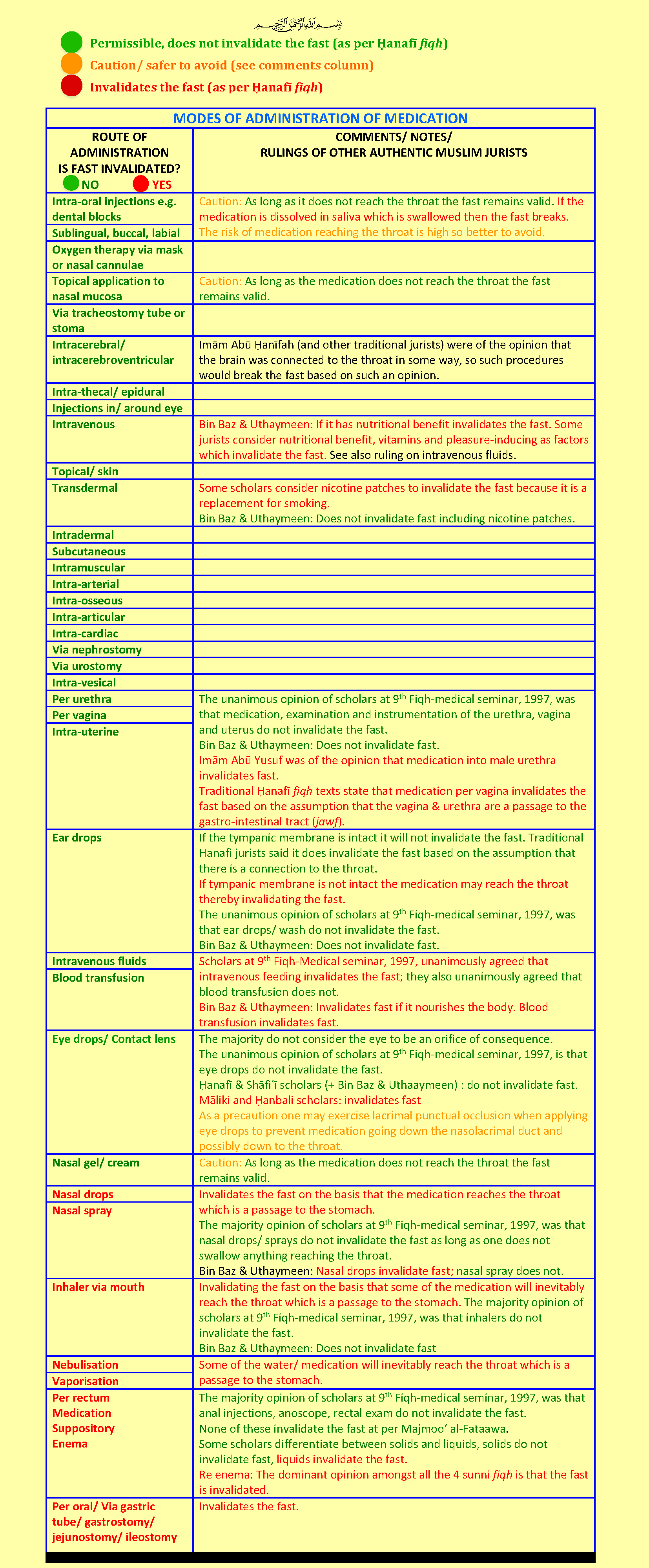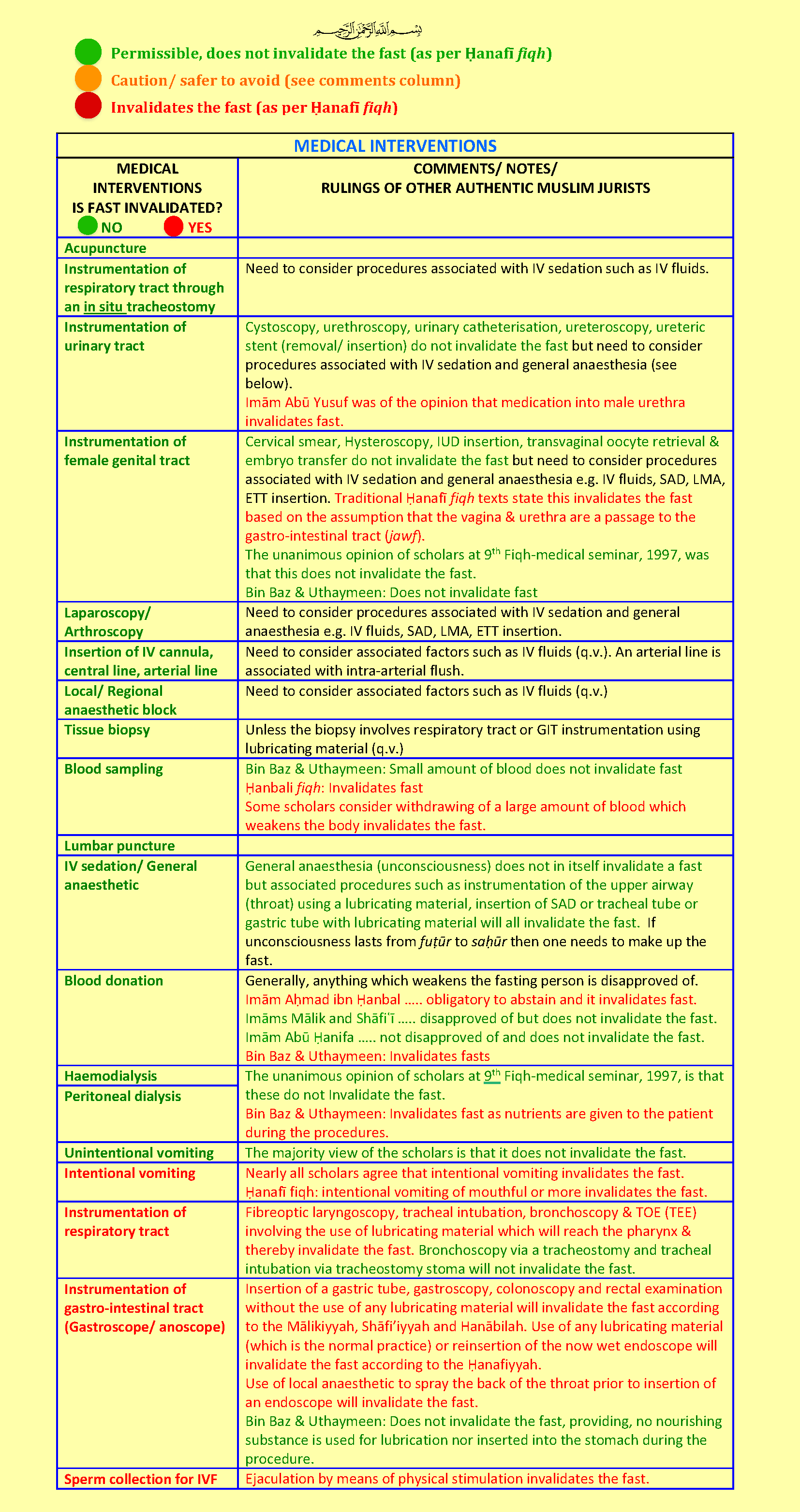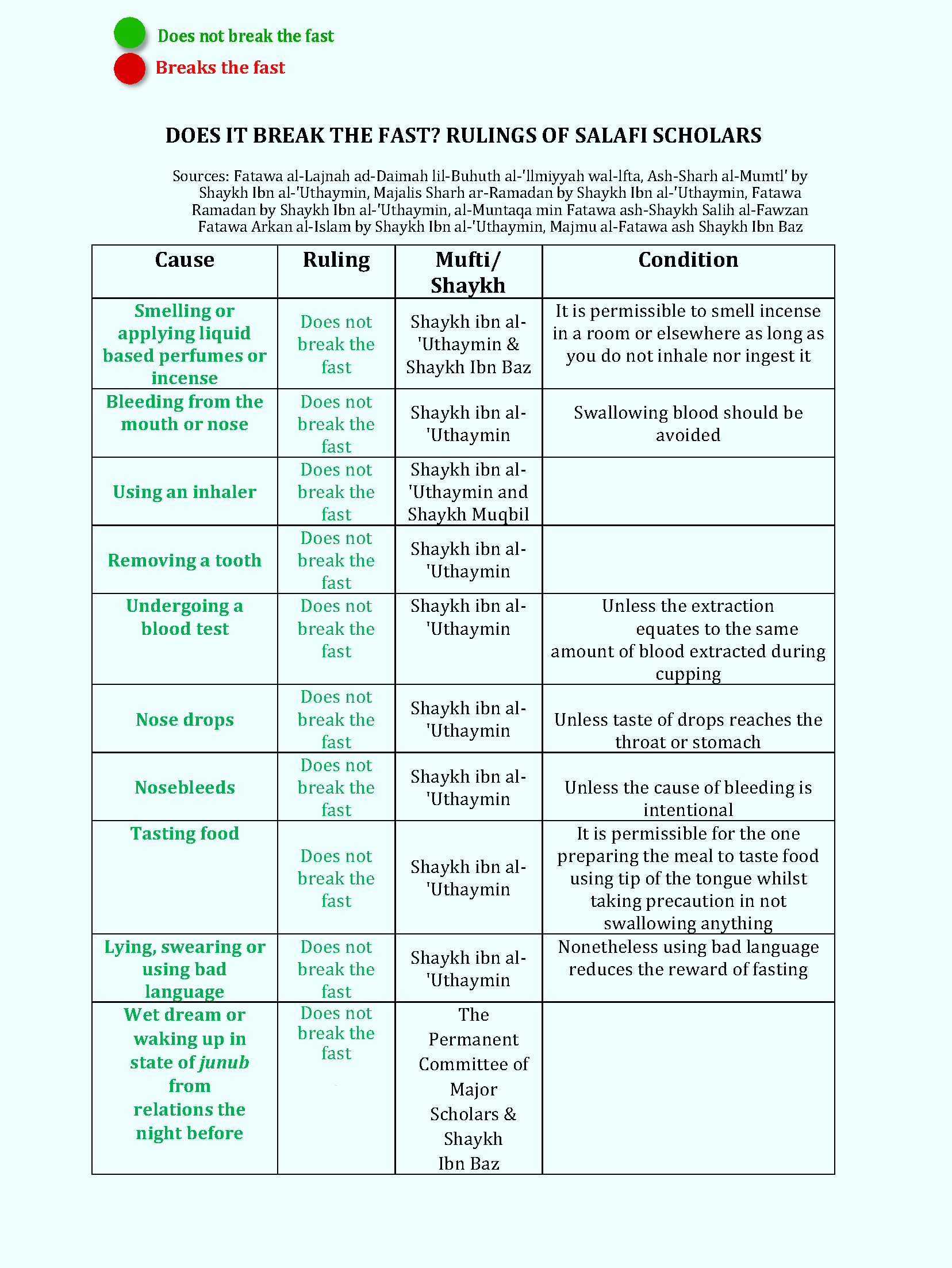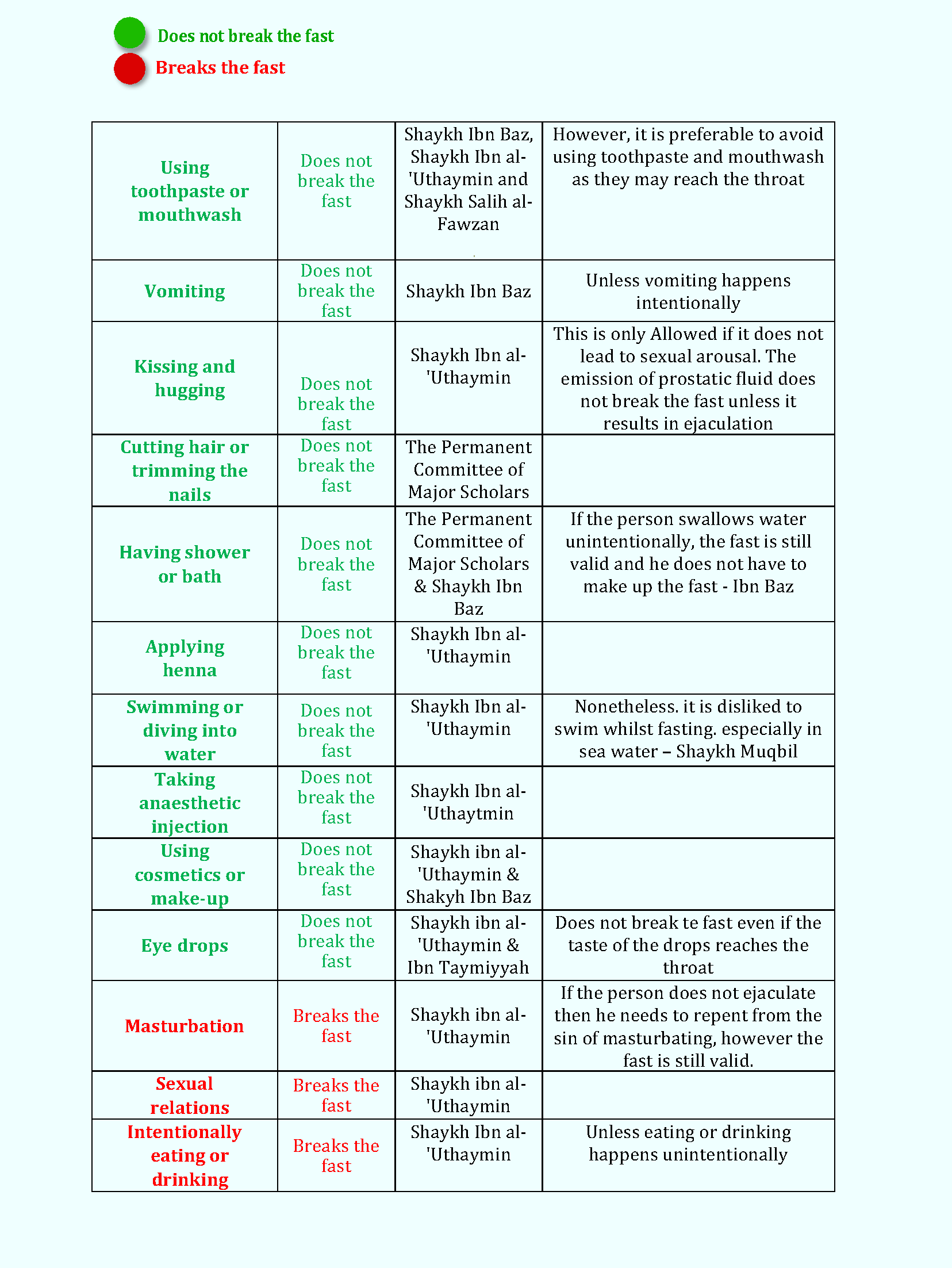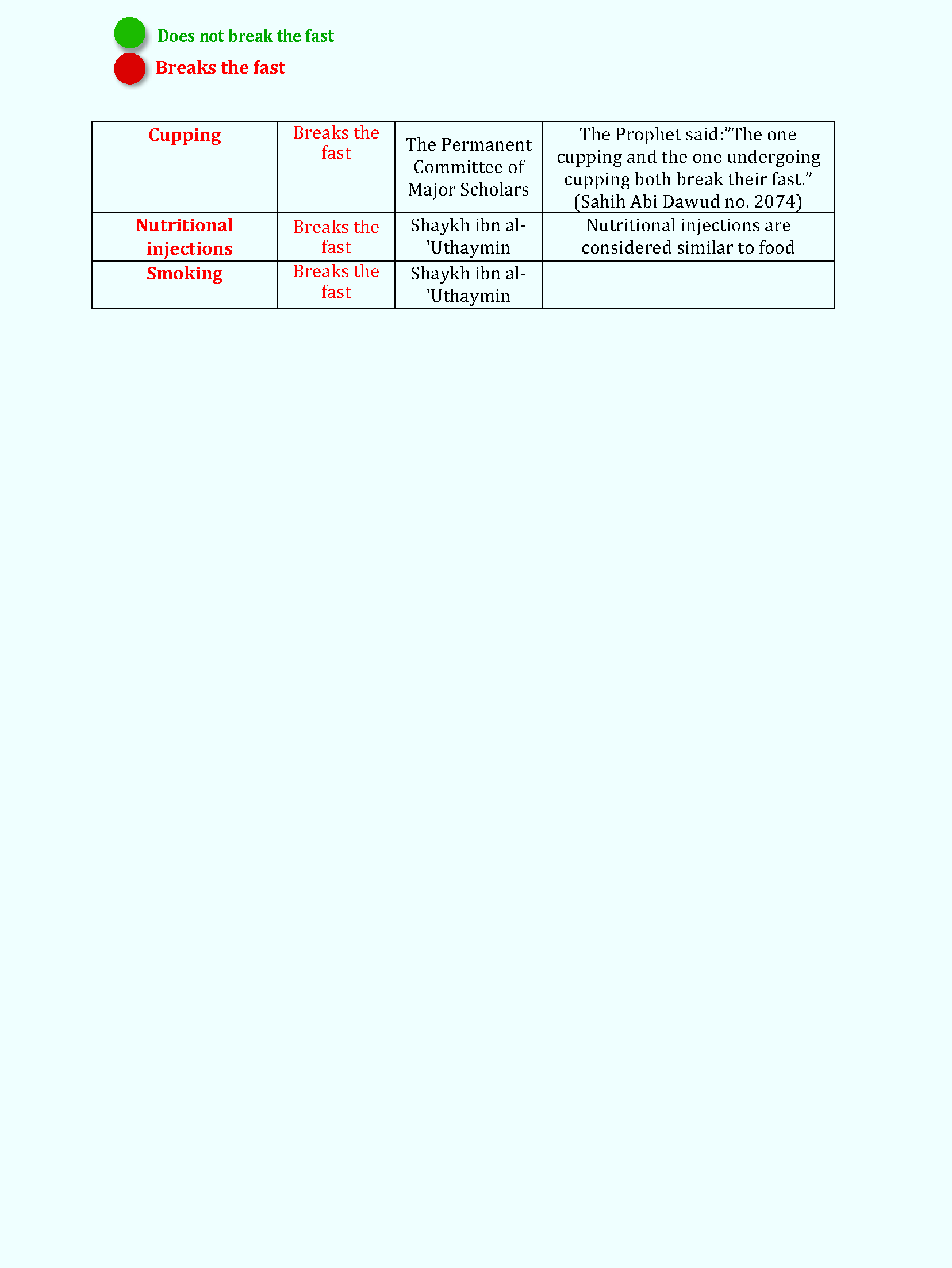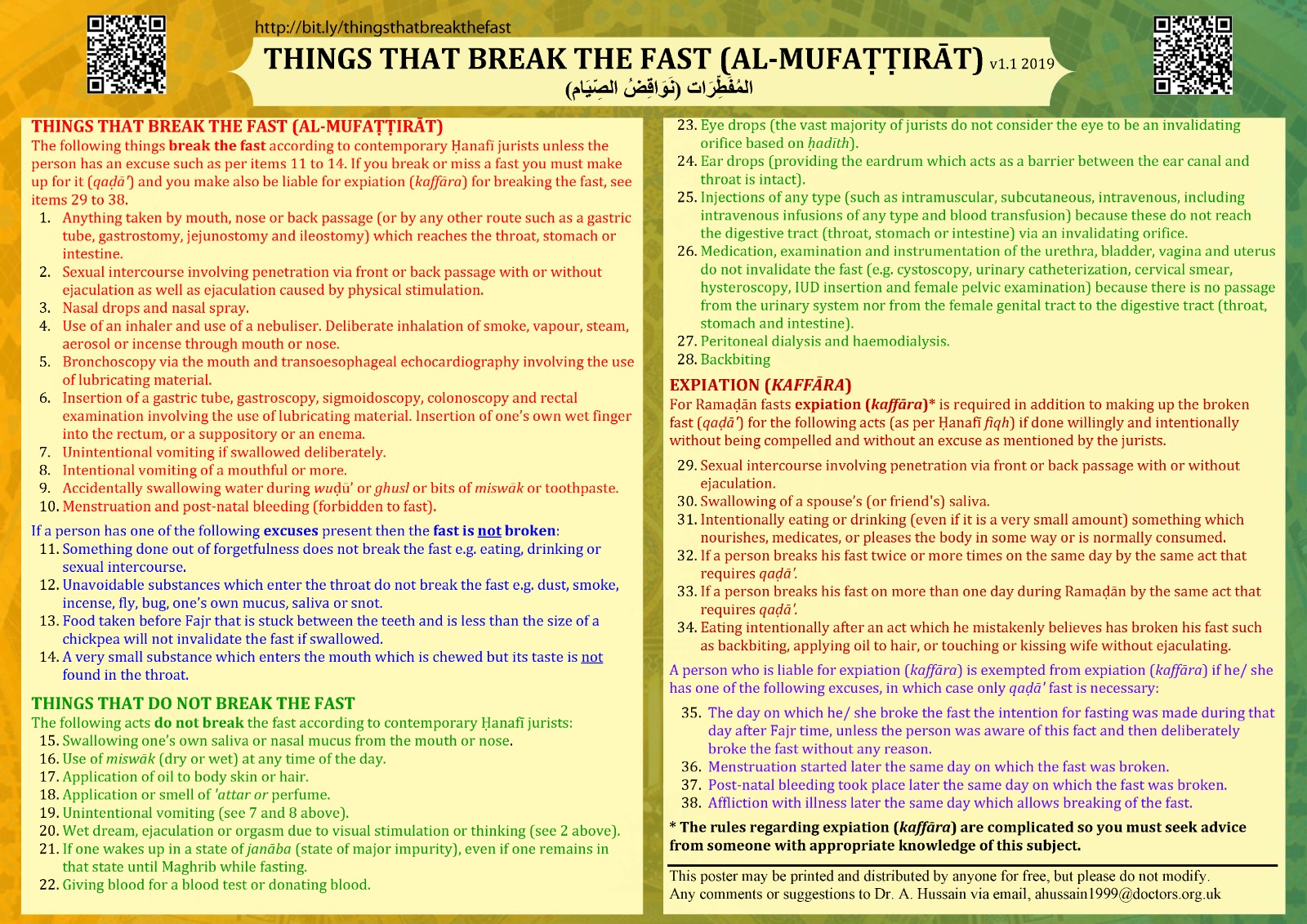بِسۡمِ اللهِ الرَّحۡمٰنِ الرَّحِيۡمِ
This webpage serves as a concise resource intended for healthcare professionals worldwide, as well as individuals interested in the impact of various medication administration methods and medical interventions on the validity of one's fast. The information on this page has been compiled from various sources and based primarily on the rulings of contemporary Ḥanafī jurists. Variant rulings are also quoted, in particular recommendations from the 9th Fiqh-Medical seminar on "An Islamic View of Certain Contemporary Medical Issues" convened in Casablanca, Morocco, from June 14-17, 1997, organized by the Islamic Organization for Medical Sciences (IOMS) and rulings from the Permanent Committee for Scholarly Research and Ifta of Saudi Arabia, specifically those of Shaykh Abdul Aziz bin Abdullāh bin Baz and Abū 'Abd Allāh Muhammad ibn Sālih Al-Uthaymīn رحمهماالله. For comments, suggestions or feedback, please contact Dr. A. Hussain via email at ahussain1999@doctors.org.uk.
Information regarding non-medical factors that invalidate fasting and guidelines for the general public are summarised on this page:
Those modes of administration and medical interventions quoted in green in the charts below indicate permissibility, i.e. such acts do not break the fast, whereas those in red indicate that such acts break the fast.
General Principle of Fasting Invalidation:
A fast is invalidated (broken) if an "agent of consequence" reaches a "cavity of consequence" (jawf) through an "orifice of consequence" via a passage (manfadh), whether natural or artificial and settles therein independently without a valid excuse (e.g., forgetfulness). Fulfilment of all these criteria is necessary for invaliding the fast according to the Ḥanafiyyah.
Agent of Consequence (Invalidating Substance):
An agent of consequence which is capable of invalidating fasting, must possess a discernible body and must remain independently within a cavity of consequence, detached from external entities, as per Ḥanafī jurists.
Cavities of Consequence (Invalidating Cavities) Jawf:
Contemporary Ḥanafī jurists primarily limit the jawf to the throat, stomach, and intestine, though classical jurists may have had variant views.
Orifices of Consequences (Invalidating Entry Points):
This encompasses all natural orifices and any non-natural orifices with a direct or indirect path to a cavity of consequence. The mouth, nose, and anus are natural orifices of consequence. A gastrostomy would be considered a non-natural orifice of consequence. Note that the lacrimal duct is not considered an orifice of consequence in Ḥanafī fiqh.
Reasons for Divergent Rulings:
Several factors contribute to the divergence of legal opinions on fasting, including:
1. Fasting as an act of worship and the rationale behind fasting: Varied interpretations exist regarding the rationality behind fasting. Some perceive fasting as directly related to hunger, thirst and nutrition, while others argue that its significance transcends mere physiological needs, resulting in the equal treatment of food and non-food substances for breaking the fast.
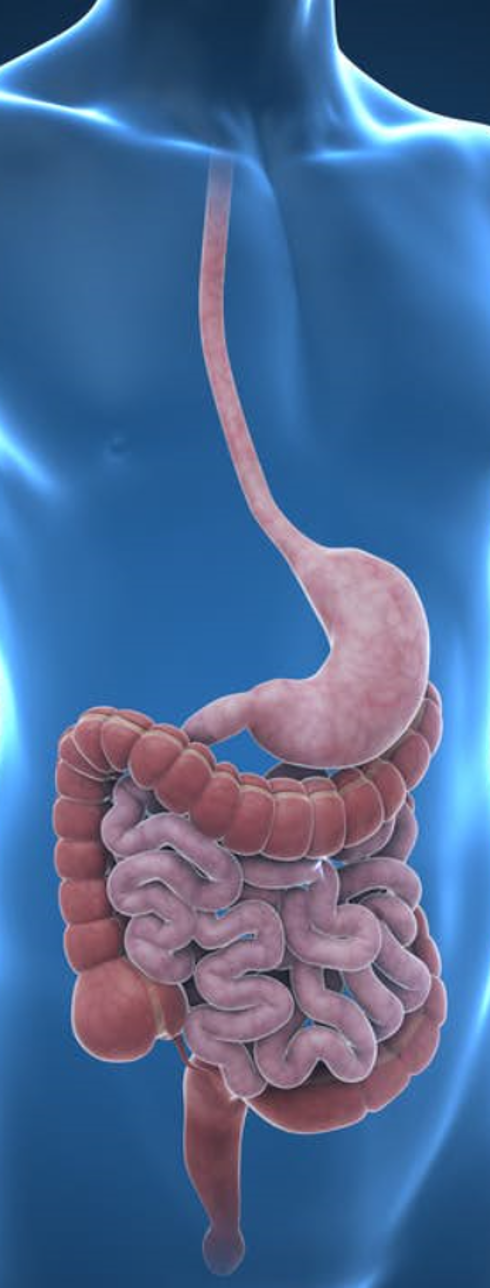
2. Definition of Jawf (Cavity of Consequence): The interpretation of jawf differs among Muslim jurists:
Classical Ḥanafī scholars identified various bodily openings, such as the throat, eyes, ears, nose, anus, urinary tract, vagina, and deep wounds leading into the jawf. Disagreements arose even among Ḥanafi jurists themselves. Some considered the brain to be part of the jawf due to its semantic significance or perceived role in nourishing the body or its connection to the throat. Others considered the female urethra and vagina, and occasionally the male urethra as being part of or connected to the jawf.
Contemporary Ḥanafī jurists typically limit the jawf to the throat, stomach, and intestine, and take into account modern knowledge of human anatomy which was not available to the classical jurists. This is the perspective adopted on this platform, although some Ḥanafī scholars still quote classical views from ancient texts.
Dental treatment during Ramadan should ideally be avoided or undertaken in the morning. Delaying the intention to fast until Islāmic midday (the midpoint between the start of Fajr and the start of Dhur) is permissible in the Ḥanafī fiqh. Provided water ingestion during treatment is avoided one can then make an intention to fast. If water or other substances are swallowed, fasting for that day cannot be done, necessitating a makeup fast later. This strategy avoids breaking a fast. This delay provision for intention applies solely to Ḥanafī fiqh.
Dr. A. Hussain
Useful links (Hanafi fiqh sites)
Nur al-idah (Classical Hanafi fiqh textbook)
Principles on what invalidates the fast based on "Dabit al-Mufattirat" by Mufti Rafi Usmani
Criterion of Breaking Fast Mufti Mohammed Zubair Butt
Actions which break the fast A Manual of Hanafi fiqh
FAQs on fasting Fatwa Jamiatul Ulema South Africa
Can one take a steam bath while fasting or not? Darul-Ifta Jamia Binoria Aalamia
Does the use of a drip break the fast? Fataawa Mahmoodiya, V: 10, P: 149, Farooqiyyah Also see.
Does Fasting become void if eye-drops are used in the eyes? Darul-Ifta Jamia Binoria Aalamia
Using Eyedrops while Fasting Fatwa Jamiatul Ulema South Africa
Can we use inhaler while fasting? Darul-Ifta Jamia Binoria Aalamia
Use of Asthma Inhaler Fatwa Jamiatul Ulema South Africa
Test of sperms for purpose of fertility while fasting in Ramadan (IVF) Darul-Ifta Jamia Binoria Aalamia
Is it permissible for a woman to have a pap smear while fasting? Darul-Ifta Jamia Binoria Aalamia
Does a cervical smear test invalidate one’s fast? Detailed fatwa by Mufti Muhammad ibn Adam (Leicester)
Is it permissible to apply a haemorrhoids ointment inside of the anus while fasting? Darul-Ifta Jamia Binoria Aalamia
Can a person make an intention to keep a Fast after Sehri time has ended? Jamiatul Ulema South Africa
__________________________________________________________________
GREEN text signifies does not break the fast.
RED text signifies does break the fast.
